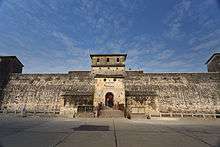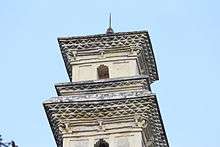Renhua County
Renhua (postal: Yanfa; Chinese: 仁化; pinyin: Rénhuà) is a county of northernmost Guangdong province, China, bordering Jiangxi to the northeast and Hunan to the northwest. It is under the administration of Shaoguan City.
Renhua 仁化县 Yanfa | |
|---|---|
County | |
 | |
.png) Location in Guangdong | |
| Coordinates: 25°05′10″N 113°44′56″E | |
| Country | People's Republic of China |
| Province | Guangdong |
| Prefecture-level city | Shaoguan |
| Area | |
| • Total | 2,204 km2 (851 sq mi) |
| Time zone | UTC+8 (China Standard) |
History
Renhua County has a long history, as it was established in AD 479, dating back more than 1500 years. [1]
- In 1949, Renhua County was liberated, as Beijiang zone of Guangdong, and established People’s Government of Renhua County (Renhua Ren Min Zheng Fu).[1]
- In 1956, it belonged to Shaoguan zone of Guangdong.
- In 1968, it withdraws people’s committee and established revolutionary committee, which belongs to revolutionary committee of Shaoguan District.[2]
- In 1980, People’s Government of Renhua County was restored and belongs to Shaoguan District.
- In 1983, Shaoguan City was established and Shaoguan District merged with it, and Renhua County is belonging to it, which has been followed so far.
Geography and climate
Renhua is located just north of the Tropic of Cancer
It has a subtropical monsoon climate (Köppen classification Cfa) which is seasonal and pleasant.
- The average annual temperature is 19.9 degrees Celsius.
- The average annual rainfall is 1660.8 mm.
- The frost-free period lasts 308 days.
| Climate data for Renhua (1981−2010) | |||||||||||||
|---|---|---|---|---|---|---|---|---|---|---|---|---|---|
| Month | Jan | Feb | Mar | Apr | May | Jun | Jul | Aug | Sep | Oct | Nov | Dec | Year |
| Record high °C (°F) | 27.2 (81.0) |
30.9 (87.6) |
32.6 (90.7) |
34.2 (93.6) |
36.1 (97.0) |
37.7 (99.9) |
40.9 (105.6) |
40.6 (105.1) |
38.5 (101.3) |
36.3 (97.3) |
33.0 (91.4) |
29.1 (84.4) |
40.9 (105.6) |
| Average high °C (°F) | 14.6 (58.3) |
15.9 (60.6) |
18.8 (65.8) |
24.4 (75.9) |
28.6 (83.5) |
31.5 (88.7) |
33.9 (93.0) |
33.9 (93.0) |
31.4 (88.5) |
27.8 (82.0) |
22.5 (72.5) |
17.5 (63.5) |
25.1 (77.1) |
| Daily mean °C (°F) | 9.7 (49.5) |
11.6 (52.9) |
14.7 (58.5) |
20.1 (68.2) |
24.0 (75.2) |
26.8 (80.2) |
28.4 (83.1) |
28.2 (82.8) |
25.9 (78.6) |
21.9 (71.4) |
16.3 (61.3) |
11.2 (52.2) |
19.9 (67.8) |
| Average low °C (°F) | 6.6 (43.9) |
8.8 (47.8) |
12.0 (53.6) |
17.1 (62.8) |
20.8 (69.4) |
23.6 (74.5) |
24.7 (76.5) |
24.5 (76.1) |
22.2 (72.0) |
17.8 (64.0) |
12.2 (54.0) |
7.2 (45.0) |
16.5 (61.6) |
| Record low °C (°F) | −2.8 (27.0) |
−2.3 (27.9) |
0.4 (32.7) |
5.1 (41.2) |
12.3 (54.1) |
15.3 (59.5) |
20.6 (69.1) |
20.9 (69.6) |
14.5 (58.1) |
5.5 (41.9) |
0.6 (33.1) |
−4.8 (23.4) |
−4.8 (23.4) |
| Average precipitation mm (inches) | 77.7 (3.06) |
117.1 (4.61) |
190.1 (7.48) |
223.0 (8.78) |
260.0 (10.24) |
223.9 (8.81) |
158.5 (6.24) |
152.1 (5.99) |
105.1 (4.14) |
58.7 (2.31) |
53.4 (2.10) |
41.2 (1.62) |
1,660.8 (65.38) |
| Average relative humidity (%) | 79 | 82 | 84 | 84 | 82 | 82 | 78 | 79 | 78 | 75 | 76 | 76 | 80 |
| Source: China Meteorological Data Service Center | |||||||||||||
Districts
Renhua has a jurisdiction of 1 street and 10 towns, including Danxia Street,Wenshao Town, Fuxi Town, Changjiang Town, Chengkou Town, Hongshan Town, Shitang Town, Dongtang Town, Daqiao Town, Zhoutian Town, Huangkeng Town. There are 109 village committee and Renhua Government is located in Danxia Street.
Language
Most commonly spoken are Cantonese, Mandarin and Hakka. Some of towns speaking Shaozhou Tuhua (Sat Na Wa).[2]
Tourism

Resorts and attractions in Renhua include: "Mount Danxia" (丹霞山), Wanshishan Grassland (万时山大草原) is one of the rare grassland in Guangdong Province. "Shuang Feng Fort" (双峰寨),The "Chengkou Ancient City" (城口古秦城), was built in the Qin Dynasty. The "Yunlong Temple Tower" (云龙寺塔) was built in the Tang Dynasty. And the "Sixi Si Ta"(澌溪寺塔)was built in the late Tang and early Song Dynasty.
Mount Danxia
Centered on Danxia land-form, Mount Danxia also named as "The Red Stone Park of China". It is the largest attraction in Guangdong Province, which covers 292 square kilometers. It formed by red lake and river gravel rock from 70 thousand years, which being well-proportioned and attracting a lot of people. In addition, it has the shape most abundant among Danxia land-form, especially the male and female stone. It is mainly divided into Danxia scenic area, Shao Shi Xian traveled scenic, attractions, scenic spots and scenic Jinjiang gallery. In 1988, mount Danxia was listed to be National Park of China,National Nature Reserve, National Geo-park and National 5A Tourist Attraction. In 2004, Danxia Mountain was listed as World Geo-park. As Geo-park, mount Danxia has a lot of resources including 1,916 kind of plant, 88 mammals, 288 birds, 86 reptiles, 37 amphibians, 100 fishes and 1,023 insects.
Wanshishan Grassland
On the highest summit in Renhua County, Wanshishan Grassland is the geography coordination of Red Triangle which used to be a battlefield during Revolutionary Period and Long Marches.[3] The annual average temperature of this special area is 17.8 degree, the annual average rainfall is 1600 m. It is rich in natural resources as there are more than 100 animals and more than 30 plants. What's more, as a grassland in Guangdong Province, Wanshishan Grassland is popular for younger or campers.
Shuang Feng Fort

Built in 1915, ShuangFeng Fort is located in Shitang Town at a distance of 19 km (12 mi) west of Renhua County. It covers 11.3 km2 (4.4 sq mi). Served as a defense fort, ShuangFeng Fort is made from limes and ancient black brick which made it very strong that none brick falling out the wall even it has more than 100 years’ history. Like many forts in ancient China, it is surrounding by moat which covers 4.878 square kilometers. In 1928, the Communist Party fought back heroically against the Kuomintang reactionaries’ bloody suppression on ShuangFeng Fort. In 2006, ShuangFeng Fort was approved by the State Council on the sixth batch of national key cultural relic unit under state protection list.[4]
Chengkou Ancient City
Located in Chengkou Town, the ancient city is at a distant of 38 km (24 mi) north of Renhua County. It controls the way from Guangdong Province to Hunan Province as it east village was fixed up the city group, south * en streams (where the west water), west street, north to SanJiaoPing to old salt. With a height of 6.2 meter, width of 4.5 meter, the Chengkou Ancient City was listed as a county-level cultural relic protection units in 1982. It was built in Qin Dynasty in the first time but was rebuilt in Qing Dynasty after destroyed.
Yunlong Temple Tower

Located in Dongtang Town,Yunlong Temple Tower was listed as a national cultural relic protection unit in 1988. Located in Dongtang Town. It is the only pagoda of Tang Dynasty in Guangdong Province that has distinctive feature construction of Tang Dynasty. As the four five imitation in the 2-foot-tall tower, it has a height of 10.34 meters. The first floor has a length of 2 meters and then decrease step by step with floor above second. In addition to build a coupon top tower, the tower is solid except the bottom of tower. The layers of waist eaves and false flat seat, a brick imitation of the wooden tower each surface, leaning against column, the forehead, fang, dou Gong, middle of Guelph form niches are arranged in a straight line.[5]
Sixi Temple Tower

Located in Dongtang Town, Sixi Temple Tower is faced with Yunlong Temple Tower across Sixi Mountain. It was built in 1075 and listed as the second paper unit of Guangdong Province. The tower has a height of 23.14 meter and made of brick, which looks pretty simple. It not only has an architectural feature of Tang Dynasty, but with the style of Song Dynasty. It is a loft-style tower which made of examinations in the imitation wood for external, the door with arch plane, shape likes flat square, round flat seat Chuanxin wall internal, with blue bricks' Chuanxin ladder, can connect to the top floor.
Local Cuisine
Cuisine in Renhua County includes Shitang Rice Wine, Field-snail Casserole, Hongshan White-hair Tea, Danxia Pickled Radish, Huangkeng Citrus Gonggan, Xiafu Pomelo.
Shitang Rice Wine

Shitang Rice Wine has a history of more than 300 years. Because it must be making by local water, the Rice Wine aromatic and clean-tasting. What’s more, a lot of wine foam of Shitang Rice Wine will stack in your cup which looks like flowers and named as "stacking flowers".
Field-snail Casserole
Field-snail Casserole is one of the local feather foodies. With the Betel nut grass which planted around local village, Field-snail Casserole is very sweet and tasty especially. What's more, this delicious food has the function of cleaning dampness and dispel-cold which is welcome by local people and evoking their memory of childhood.
Hongshan White-hair Tea

Hongshan White-hair Tea was used to be royal tribute in Qing Dynasty. This is a kind of green tea which has the leaves hair in white, tastes sweet and delicate. As the first of three white-hair tea in China, it brings you natural orchid’s fragrance.
Danxia Pickled Radish
There is a saying that if you didn’t eat the Danxia Pickled Radish that means you haven’t been to Renhua. The shop selling Danxia Pickled Radish is located between square and Renhua High School. Danxia Pickled Radish which made by local secret recipe, round and mouth filled with crispy acidity.
Huangkeng Citrus Gonggan

Neighboring Danxia Mountain, Huangkeng has its special climate and soil condition which is suitable for Gonggan growing. The feature of Huangkeng Citrus Gonggan is "Thin skin", seedless and flesh tasting sweet like honey.
Xiafu Pomelo
Xiafu Pomelo is in the top grade of other grapefruit in China. It has the feature of sweet and fragrance. With its climate and soil conditions the shape, flesh and tasty of Xiafu pomelo is the same as the pomelo in Shatian Guangxi.
References
- Renhua Government Official County Portal Accessed Nov.11.2015.
- Shaoguan Information Guangdong Government Information Accessed Nov.11.2015.
- Wanshishan Tourism Wanshishan Grassland Assess Dec 2, 2015.
- ShuangFengFort ShuangFengFort Accessed Nov 13, 2015.
- Yunlong Temple Tower Yunlong Temple Tower Accessed Dec 8, 2015.